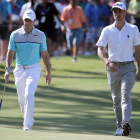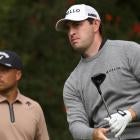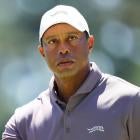Christmas is two weeks away, and the golf offseason has finally arrived ... right in the middle of the 2017-18 PGA Tour season. I don't really understand it, but I'm going to enjoy it because golf cranks up again just a few weeks after Christmas with the two-tournament Hawaii swing, and then we're off on our nine-month journey.
There is, of course, all kinds of intrigue going into the 2018 calendar year. There already was before Tiger Woods started swinging his driver like he was Tony Finau down in the Bahamas two weeks ago, and now that intrigue has been multiplied. That's great for golf and great for people like me who think and talk about golf for a living. I don't care if Tiger wins or loses in 2018, only that he plays and plays at a high level.
That's obviously question No. 1 on the minds of everyone, and we will get to that one in Part II. But first let's dive into a few other questions I have for the next year -- a year in which, as long as Big Cat stays healthy, could be one of the most fascinating we've ever seen in professional golf.
1. Is this Rickie Fowler's major year? It feels like we've been asking this for the last five years, and it's going to hit, eventually. Right? I posited on a recent podcast that I think one of Fowler's problems when it comes to winning majors is that he doesn't seem to have the intuitive understanding of the rhythm of a tournament that so many of the great ones have. Guys like Tiger Woods and Jordan Spieth seem like they would lose a lot of 71- and 73-hole tournaments that they end up winning over the course of 72 holes because they understand exactly when they need to pull out in front.
I realize that sounds completely insane, but thus far Fowler has lacked that "screw this, I'm taking this tournament and nobody can stop me" kick that Spieth has shown. The glaring hole in my argument is Fowler's Players Championship win in 2015 in which he played the final six holes in, like, 88 under. But even then it felt less like him saying, "I'm winning this and you can't stop me" and more like he just got hot at the right time.
Maybe it doesn't matter. Maybe it does. Maybe he'll eventually get hot at the right time at a major championship like he did with that 61 in Round 4 at the Hero World Challenge earlier in December.
I think Fowler will win a major eventually regardless, mostly because he's too good not to. Spieth will win a lot of majors because he has it, whatever it is. He bends tournaments to his will and takes their trophies home. Fowler will win at least one just because he's damn good at golf.
One thing that concerns me (and has been concerning me) is that his 2016-17 success seemed to be buoyed by his putter. He gained twice as many strokes per round (0.75) as he has in any other season in his career. That doesn't mean he can't win the big one, but I'd like to see some improvement in the other strokes gained categories (tee-to-green and driving).
2. Can Bubba Watson stay in the top ... 100? Watson's 2017 was one to forget. He's trending towards no longer being a top 100 player just a few years after winning his second Masters. After ditching whatever arrangement he had with Volvik, Watson no longer has a built-in excuse (and to his credit, never blamed his struggles on the ball).
For him, it's always been about how dedicated he is to the craft and whether other (and often more important) interests pull him away from his time as an elite player. The next few years will be telling of whether Watson is done as a Masters contender and Ryder Cup player or if 2017 was an aberration all the way around.
#OWGR downside story:@bubbawatson's drop from #10 to #89 during 2017 is the biggest drop ever from inside Top10 in a calendar year.
— Nosferatu (@VC606) December 12, 2017
3. What does Justin Thomas do for an encore? When aliens invade our planet in 150 or 200 years, one of the first questions will be, "Why in the hell did you guys not make a bigger deal out of Justin Thomas' 2016-17 PGA Tour season?" OK, maybe not one of the first, but certainly one of the first sports questions. The answer is that he won tournaments that ended at odd times (CIMB Classic, Sony Open, Tournament of Champions) and upended the main attraction (Jordan Spieth) in his chase for the career slam at the PGA Championship.
In some ways, Thomas is better equipped than most to deliver an encore to what he did in 2017.
He has noted that he will consult Spieth and his newfound pal Tiger Woods about how to handle all that's coming at him. Plus, he didn't step outside of his statistical profile to grab those five wins plus the FedEx Cup last season. Thomas has always been an elite iron player (6th in approach shots last year) and as long as his putting stays average to above average (47th in 2017), he's going to win a ton. Five times and a major again? I don't know about that, but he's already got a one tournament head start (he won again when you weren't watching at the CJ Cup in October).
4. Rory McIlroy is still great, right? Yes, that's right. McIlroy went winless as a professional in 2017 for the first time since 2008 and had an injured rib and balky wedge game to blame. He also changed clubs (again) and caddies (for the first time), and got married. So yeah, it was one of the busiest 0-win seasons for a future Hall of Famer ever.
The problem with him was his play from 100-125 yards (145th) and his strokes gained putting (140th). It's the second year in a row that he's finished 135th or worse in putting. Just like we saw with Thomas in 2017, if he putts in the 40th-60th range on the PGA Tour, he'll win a ton.
He's self aware enough to understand both of these issues and has voiced as much publicly. Is his body well enough this winter for him to get the reps he needs to be able to correct them, especially the wedge play? If the video below is any indication, the answer seems to be yes. That's the big point in all of this for me.
It has always been true and will continue to be true for the remainder of his career that if he puts averagely, McIlroy will win a preposterous number of tournaments. Because of this, McIlroy will go through long stretches of the best golf any of us have ever seen and long stretches when you wonder if he would have won the Northern Ireland Amateur. He's still 28, though, and still has goals (being the best European and international player ever) to motivate him. There's no doubt he's still great. The real question for 2018 and beyond is really, will he stay healthy, and if so, how great can he still be?
5. Will the U.S. continue its dominance in team events? The U.S. has won three consecutive team events, and they have gotten progressively more dominant. After a narrow Presidents Cup victory in 2015, the U.S. dominated Sunday at the Ryder Cup in 2016 and turned the 2017 Presidents Cup into a victory helicopter ride for President Donald Trump.
One of my colleagues recently declared the Ryder Cup over and dead, and there's merit to the argument (even if I don't fully subscribe to it). The U.S. hasn't won in Europe since 1993 so a victory in Paris could be considered the beginning of a mini dynasty given the youth that will be on that team. A blowout could result in an actual dynasty that won't be usurped for several years. Consider this: With Thomas, Spieth, Fowler, Brooks Koepka and others headlining this U.S. squad, they could go to Rome in 2022 having won seven straight team events (four Presidents Cups and three Ryder Cups). That's not an infeasible proposition nor an unreasonable one.
They will surely be favored on home soil in 2020 against Europe and will always be favored in the Presidents Cup. All of this could turn, of course, on the clubs of Jon Rahm, Rory McIlroy, Thomas Pieters and Co. Regardless, we're going to get one of the most intriguing Ryder Cups of our lifetime.





















